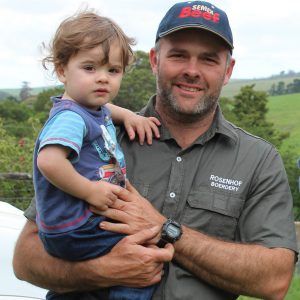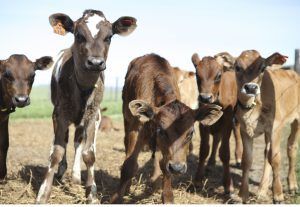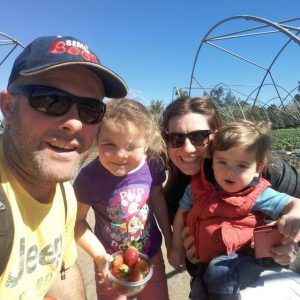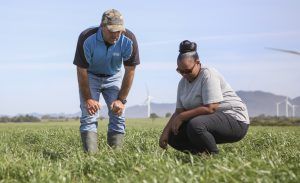
Jacobus and son JC
Cool, calm and collected are the three adjectives that come to mind when describing Jacobus Vermaak (JV). I believe these are very important traits to possess, especially as a farmer as I think there a very few professions that tests one’s patience like farming. Jacobus, along with his sister Maizie (Get to know Maize here), manage their family farm, Rosenhof, together.
His love for the outdoors, along with having grown up on the farm, is one of the reasons why he went into farming. He enjoys a good glass of wine and also finds comfort in spending time with his family. His family farm is located in the Oyster Bay area in the Eastern Cape where they are milking just over 1000 cows.I caught up with Jacobus and learnt more about his passion for farming and the success they have had on the farm over the years.
PP: When did you start farming and did you grow up on a farm?
JV: At the end of 2002. Yes, on Rosenhof, were I’m farming at the moment.
PP: Why did you want to become a farmer?
JV: I love to be in the outdoors, and to see how things grow and develop. On a farm there is always something going on, yes there are everyday activities that stay the same, but each day brings new opportunities or challenges.
PP: Are there any differences between your farm now and your farm when you were a kid?
JV: When I was a kid, my father farmed with beef cattle and sheep, and he started milking only roundabout 1994, when I was in standard 7/Grade 9. We used to milk on dry lands only, but changed to dry land and irrigated pastures in 2012.

Calves at Rosenhof farm Photo by Impact Studio
PP: What is the biggest change you have encountered during your years of farming?
JV: Dry land milking in a herringbone parlour, to irrigated pastures milking in a rotary.
PP: How have advances in technology such as, machinery, genetics, or chemicals, affected your farm? You can give an example
JV: Moving away from the herringbone parlour to a rotary parlour, more in the middle of the milking platform, using a breeding program on the dairy cows to breed genetically superior animals, and putting up pivots, have had a tremendous effect on the farm.
PP: Have you observed changes in the number, size and type of farms that are found in your immediate locale? What is your attitude toward any trends you may have noticed?
JV: The farms are getting bigger, but in our area the number of farms stay fairly constant. It is about keeping up with cost-margins, you have to expand or become better at what you do to survive.

Jacobus with wife Juls and their kids Luka and JC.
PP: In another world, where you were not a farmer, what work do you think you would do?
JV: Something outdoors, maybe game ranger or vet.
PP: What are the most difficult and most satisfying aspects of farming for you?
JV: Most difficult: trying to find the middle road in keeping everyone involved on the farm happy and motivated. Most satisfying: Seeing positive results after doing the initial work to get something going, for example seed germinating after planting, cows producing milk from pastures, new developments kicking in.

Jacobus and myself discussing pasture and soil management.
PP: What advice could you give to any young person interested in getting into farming?
JV: There is a bright future in farming, because everybody must eat! You are rewarded for putting in an effort to accomplish something. You get to work close to nature, and through working close to nature, it becomes easy to see God’s hand in everything around us.
- The management of soils with excessive sodium and magnesium levels - 2023-06-12
- Understanding evapotranspiration better - 2021-10-18
- Soil fungi connections - 2021-09-28
